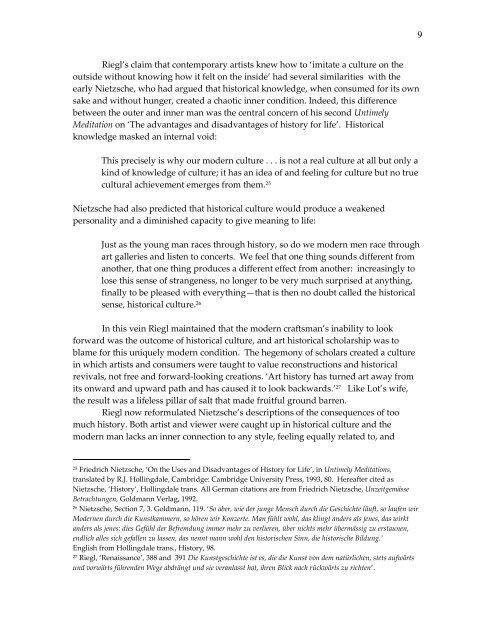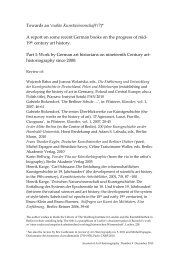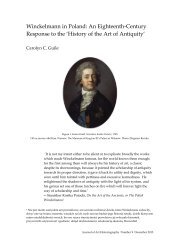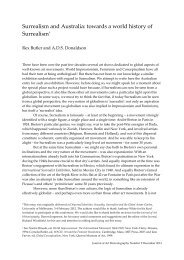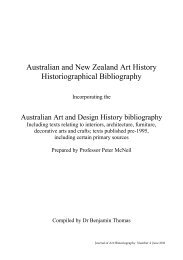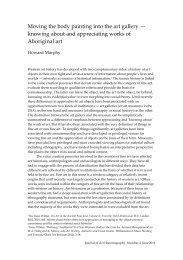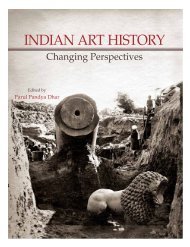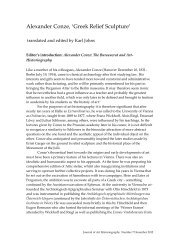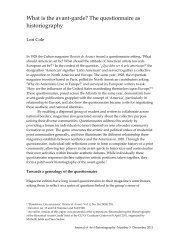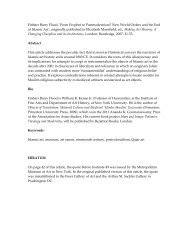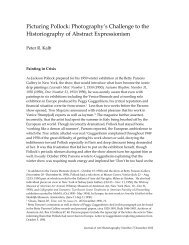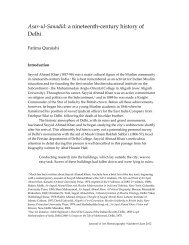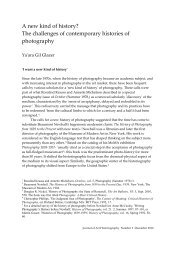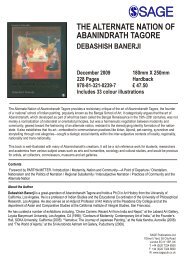The advantages and disadvantages of Art History to Life: Alois Riegl ...
The advantages and disadvantages of Art History to Life: Alois Riegl ...
The advantages and disadvantages of Art History to Life: Alois Riegl ...
Create successful ePaper yourself
Turn your PDF publications into a flip-book with our unique Google optimized e-Paper software.
<strong>Riegl</strong>’s claim that contemporary artists knew how <strong>to</strong> ‘imitate a culture on the<br />
outside without knowing how it felt on the inside’ had several similarities with the<br />
early Nietzsche, who had argued that his<strong>to</strong>rical knowledge, when consumed for its own<br />
sake <strong>and</strong> without hunger, created a chaotic inner condition. Indeed, this difference<br />
between the outer <strong>and</strong> inner man was the central concern <strong>of</strong> his second Untimely<br />
Meditation on ‘<strong>The</strong> <strong>advantages</strong> <strong>and</strong> dis<strong>advantages</strong> <strong>of</strong> his<strong>to</strong>ry for life’. His<strong>to</strong>rical<br />
knowledge masked an internal void:<br />
This precisely is why our modern culture . . . is not a real culture at all but only a<br />
kind <strong>of</strong> knowledge <strong>of</strong> culture; it has an idea <strong>of</strong> <strong>and</strong> feeling for culture but no true<br />
cultural achievement emerges from them. 25<br />
Nietzsche had also predicted that his<strong>to</strong>rical culture would produce a weakened<br />
personality <strong>and</strong> a diminished capacity <strong>to</strong> give meaning <strong>to</strong> life:<br />
Just as the young man races through his<strong>to</strong>ry, so do we modern men race through<br />
art galleries <strong>and</strong> listen <strong>to</strong> concerts. We feel that one thing sounds different from<br />
another, that one thing produces a different effect from another: increasingly <strong>to</strong><br />
lose this sense <strong>of</strong> strangeness, no longer <strong>to</strong> be very much surprised at anything,<br />
finally <strong>to</strong> be pleased with everything—that is then no doubt called the his<strong>to</strong>rical<br />
sense, his<strong>to</strong>rical culture. 26<br />
In this vein <strong>Riegl</strong> maintained that the modern craftsman’s inability <strong>to</strong> look<br />
forward was the outcome <strong>of</strong> his<strong>to</strong>rical culture, <strong>and</strong> art his<strong>to</strong>rical scholarship was <strong>to</strong><br />
blame for this uniquely modern condition. <strong>The</strong> hegemony <strong>of</strong> scholars created a culture<br />
in which artists <strong>and</strong> consumers were taught <strong>to</strong> value reconstructions <strong>and</strong> his<strong>to</strong>rical<br />
revivals, not free <strong>and</strong> forward-looking creations. ‘<strong>Art</strong> his<strong>to</strong>ry has turned art away from<br />
its onward <strong>and</strong> upward path <strong>and</strong> has caused it <strong>to</strong> look backwards.’ 27 Like Lot’s wife,<br />
the result was a lifeless pillar <strong>of</strong> salt that made fruitful ground barren.<br />
<strong>Riegl</strong> now reformulated Nietzsche’s descriptions <strong>of</strong> the consequences <strong>of</strong> <strong>to</strong>o<br />
much his<strong>to</strong>ry. Both artist <strong>and</strong> viewer were caught up in his<strong>to</strong>rical culture <strong>and</strong> the<br />
modern man lacks an inner connection <strong>to</strong> any style, feeling equally related <strong>to</strong>, <strong>and</strong><br />
25 Friedrich Nietzsche, ‘On the Uses <strong>and</strong> Dis<strong>advantages</strong> <strong>of</strong> <strong>His<strong>to</strong>ry</strong> for <strong>Life</strong>’, in Untimely Meditations,<br />
translated by R.J. Hollingdale, Cambridge: Cambridge University Press, 1993, 80. Hereafter cited as<br />
Nietzsche, ‘<strong>His<strong>to</strong>ry</strong>’, Hollingdale trans. All German citations are from Friedrich Nietzsche, Unzeitgemässe<br />
Betrachtungen, Goldmann Verlag, 1992.<br />
26 Nietzsche, Section 7, 3. Goldmann, 119. ‘So aber, wie der junge Mensch durch die Geschichte läuft, so laufen wir<br />
Modernen durch die Kunstkammern, so hören wir Konzerte. Man fühlt wohl, das klingt <strong>and</strong>ers als jenes, das wirkt<br />
<strong>and</strong>ers als jenes: dies Gefühl der Befremdung immer mehr zu verlieren, über nichts mehr übermässig zu erstaunen,<br />
endlich alles sich gefallen zu lassen, das nennt mann wohl den his<strong>to</strong>rischen Sinn, die his<strong>to</strong>rische Bildung.’<br />
English from Hollingdale trans., <strong>His<strong>to</strong>ry</strong>, 98.<br />
27 <strong>Riegl</strong>, ‘Renaissance’, 388 <strong>and</strong> 391 Die Kunstgeschichte ist es, die die Kunst von dem natürlichen, stets aufwärts<br />
und vorwärts führenden Wege abdrängt und sie veranlasst hat, ihren Blick nach rückwärts zu richten’.<br />
9


